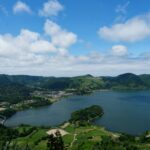
5 sustainable projects to discover in the Azores
When you think of the Azores, your mind immediately fills with the colors green and blue, which, in themselves, could be synonymous with sustainability. However,
Hand-picked by BBC journalists and world experts in the field of sustainable travel, these destinations – which include the Azores – look at tourism as a way of supporting communities and preserving environmental and cultural heritage.
BBC Travel has presented its first list of must-see destinations for this year, highlighting 25 places that promote sustainable tourism.
Although travel has the potential to overwhelm and even harm places, “each of these 25 locations not only welcomes visitors and offers incredible travel experiences, but also uses tourism to support local communities, protect the environment or preserve its unique cultural heritage (…). Traveling thoughtfully means considering where your trip can serve the greater good,” points out the BBC Travel.
The list was drawn up with the help of BBC Travel journalists and experts from organizations such as the World Tourism Organization, Sustainable Travel International, the Black Travel Alliance and the World Travel & Tourism Council. One of the 25 destinations is Portuguese: the Azores.
Here’s the full list of 25 destinations:
Dominica recently created the world’s first sperm whale reserve. It now offers the experience of swimming with these whales in an ethical and sustainable way, as part of the Caribbean island’s innovative commitment to marine conservation and regenerative tourism.
The permits are limited and guarantee “intimate and respectful encounters, offering visitors a once-in-a-lifetime experience to share the water with these incredible cetaceans, while facilitating research and creating sustainable tourism opportunities for local residents”.
Dominica is more than just a destination – “it’s a movement to support a thriving ecotourism model that balances biodiversity conservation with economic growth, ensuring that your adventure helps protect this natural paradise for generations to come”.
Once a center of the highly polluting copper smelting industry, the Japanese island of Naoshima is now a destination celebrated for its contemporary art and architecture.
Various initiatives – such as the New Naoshima Art Museum, the Setouchi Triennale and the works and museums created as part of the Benesse Art Site Naoshima – are helping to revitalize Naoshima and the surrounding islands in a unique symbiosis of art, architecture and nature.
In the midst of preparations for the 2026 Winter Olympics, the Dolomites are investing in their tourist infrastructure, including improved links to public transport operating in the area.
In addition to the popular winter ski season, visitors are encouraged to explore the Dolomites during the other seasons in order to reduce tourist pressure and its impact. One of the activities suggested by BBC Travel is the new Cammino Retico of 2024, a 170 km, seven-day trail linking remote villages between the regions of Veneto and Trentino.
Greenland is synonymous with mountains, ice, majestic fjords and untouched wilderness, promoting adventures of a lifetime such as hiking and whale watching.
According to BBC Travel, “the country is welcoming conscientious adventure travelers who love to explore, while respecting its incredible nature and unique Inuit culture. Greenland has adopted a commitment ‘to better tourism’ and a new law aims to direct tourism funds to the benefit of local communities.”
“In recent years, Wales has positioned itself at the forefront of sustainable and culturally-oriented travel. Tourism has contributed to the revival of the Welsh language and the nation is in the middle of a £5 billion multi-year program using tourism funds to make several destinations more environmentally sustainable,” points out BBC Travel.
As part of its Year of Croeso 2025 celebration – a year-long event showcasing Welsh culture, language and attractions – Wales is investing in mobility bikes to help more adventurers explore its wild side.

Now let’s look at the only Portuguese destination on the list.
In addition to its steaming natural hot springs, jewel-colored lakes, black sand beaches and whale-watching opportunities, the BBC praises the Azores for being “Europe’s largest protected marine sanctuary”.
“In ground-breaking legislation passed in October 2024, the newly designated Azores Marine Protected Area will span 287,000 km2 (an expanse larger than the whole of Great Britain) and safeguard the deep-sea corals, sharks and the 28 species of whales and dolphins found here. Protecting the long-term health and biodiversity of these coral reefs will be a bless for travelers eager to take part in whale-watching expeditions and sustainable marine research in the coming years,” stresses the BBC.


When you think of the Azores, your mind immediately fills with the colors green and blue, which, in themselves, could be synonymous with sustainability. However,

The Azores exceeded some of the benchmarks required for this recognition, in areas such as greenhouse gas emissions, drinking water consumption, habitat conservation and socio-economic

This article addresses an action that promotes change towards more inclusive, safe, resilient and sustainable cities and communities, helping toreduce the adverse environmental impact of cities.
 To discover businesses that are actively working to contribute to this Sustainable Development Goal, click here.
To discover businesses that are actively working to contribute to this Sustainable Development Goal, click here. To read news, interviews or tips related to this Goal, click here.
To read news, interviews or tips related to this Goal, click here.Esta publicação também está disponível em:
![]() Português (Portuguese (Portugal))
Português (Portuguese (Portugal))